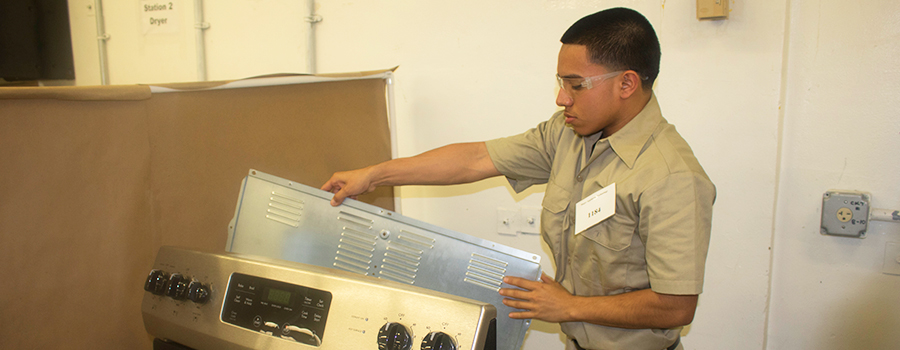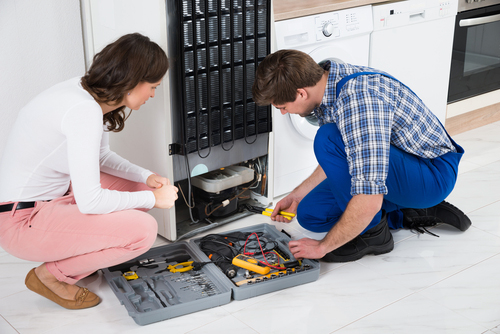Necessary Tips for Effective Ref Repair Service to Prolong Device Life Expectancy
When it comes to your fridge, correct repair work and maintenance are essential for durability. Understanding common problems and understanding when to act can make all the difference.
Understanding Usual Fridge Troubles
Refrigerators are crucial in keeping your food fresh, but they can come across a variety of common problems that disrupt their performance. One frequent concern is insufficient cooling. If you observe food spoiling quicker than typical, check the thermostat settings or think about if the door seals are harmed. Another common trouble is excessive sound, which can indicate a malfunctioning compressor or a falling short fan. You might likewise experience water merging inside or beneath the fridge; this typically arises from a blocked defrost drain or a malfunctioning water line. Furthermore, if your fridge's light isn't working, it might be a simple bulb problem or an issue with the door switch. Ice accumulation in the freezer can prevent air movement and cooling performance. Identifying these problems early can conserve you money and time out of commission, guaranteeing your refrigerator runs smoothly and efficiently.
Routine Maintenance Practices
To maintain your appliances running efficiently, you need to remain on top of routine upkeep practices. Clean the condenser coils, inspect the door seals, and keep track of the temperature level settings to guarantee peak efficiency. These simple jobs can save you money and time on repair services down the line.
Clean Condenser Coils Consistently
Cleaning your condenser coils regularly can substantially boost your home appliance's efficiency. Dust and dust accumulate on these coils over time, triggering your appliance to work more challenging and eat more energy. To keep them tidy, unplug your appliance and thoroughly remove any protective covers. Make use of a vacuum cleaner with a brush attachment or a soft brush to carefully remove particles. If needed, a mixture of warm water and mild cleaning agent can help eliminate persistent gunk. See to it to allow everything dry entirely prior to rebuilding and connecting the home appliance back in. Aim to cleanse your coils a minimum of two times a year, or more frequently if you have family pets or live in a dusty atmosphere. This basic job can extend the lifespan of your device considerably.
Inspect Door Seals
3 basic steps can help you assure your appliance's door seals are in excellent problem. Second, tidy the seals using cozy, soapy water to get rid of any kind of debris or crud. By following these actions, you'll maintain your appliance's efficiency and long life, saving you money on power expenses and repair work in the long run.
Monitor Temperature Settings
Frequently monitoring your appliance's temperature level setups is important for ideal efficiency and performance. Whether you're handling a refrigerator, freezer, or oven, watching on these setups can stop numerous issues. For refrigerators, objective for temperature levels in between 35 ° F and 38 ° F; for freezers, stick around 0 ° F. If the temperatures are expensive or reduced, your device might function harder, losing power and reducing its lifespan. Utilize a thermostat to inspect these settings frequently, specifically after major modifications, like relocating your device or changing the thermostat. If you see variations, readjust the setups appropriately and consult the individual handbook for support. By staying positive regarding temperature tracking, you'll assure your home appliances run efficiently and last much longer.
Repairing Air Conditioning Issues
When your fridge isn't cooling correctly, it can bring about spoiled food and wasted cash, so resolving the concern promptly is critical. Begin by inspecting the temperature level settings to confirm they go to the suggested levels, normally around 37 ° F for the fridge and 0 ° F for the fridge freezer. If the setups are appropriate, check the door seals for any type of voids or damages; a defective seal can allow cozy air to go into.
Next, analyze the vents inside the fridge and fridge freezer. Validate they're not obstructed by food items, as this can interfere with air movement. Listen for the compressor; if it's not running or making uncommon noises, it may require focus. Examine the condenser coils, usually located at the back or bottom of the system. Dust and debris can accumulate, triggering cooling concerns. Clean them with a vacuum or brush to optimize performance. If problems continue, it may be time to call an expert.
Fixing Water Leak and Ice Build-Up
If you're taking care of water leakage or ice accumulation in your home appliance, it's vital to recognize the resource of the trouble. By determining where the water is coming from, you can stop more problems and stay clear of pricey repair work. Let's discover some reliable approaches to take on these typical troubles.
Identify Leakage Resources
Exactly how can you efficiently determine the sources of water leakage and ice build-up in your appliances? Start by inspecting the seals and gaskets on your fridge and fridge freezer doors. By methodically examining these locations, you'll determine the source of the problem, enabling you to take the necessary steps to fix it and extend your appliance's life-span.
Avoid Ice Development
To stop ice development in your home appliances, start by verifying the temperature level settings are appropriate. If your fridge or freezer is also cold, it can bring about extreme ice build-up. Check the door seals consistently; damaged seals can let cozy air in, causing condensation and ice development.
Keep the appliance well-ventilated and avoid congestion, as this can obstruct air flow - Refrigerator repair experts Dependable Refrigeration & Appliance Repair. Additionally, routinely defrost your fridge freezer if it doesn't have an automatic defrost attribute.
If you observe water leakage, determine and deal with any obstructed water drainage openings, as they can add to ice build-up. Ultimately, tidy the coils and validate they're operating correctly to preserve peak efficiency. Taking these actions will certainly help prolong your appliance's lifespan and efficiency.
Attending To Noisy Fridge Sounds
While it might seem disconcerting, a noisy fridge often indicates minor concerns as opposed to major breakdowns. Initially, identify the resource of the sound. Usual offenders consist of the compressor, fans, and water lines. If you listen to a humming audio, it may be the compressor striving; this might simply be a normal operation noise.
Next, look for loosened products inside. In some cases, containers or shelves can rattle, developing undesirable sound. Tighten up or rearrange them to get rid of the noises.
If you notice a clicking noise, it could be the defrost timer. This is generally safe however could show it requires inspection.
An out of balance home appliance can create resonances and noise. Refrigerator repair experts Dependable Refrigeration & Appliance Repair. Addressing these concerns quickly can help keep your refrigerator's efficiency and extend its life expectancy.
When to Replace Parts vs. Complete Substitute

Think about the expense of fixings versus the device's worth. Furthermore, if you discover recurring problems that keep recurring, it's an indicator that your home appliance has reached the end of its life.
Knowing When to Call a Specialist
How can you tell when it's time to employ a professional for home appliance repair? If you see unusual noises, scents, or leaks, it's a clear signal that something's incorrect. Do not disregard these signs; they typically suggest deeper issues. If your device stops working completely or regularly trips circuit breakers, it's another warning.
You must find this likewise consider your own comfort degree with fixings. If you're unclear concerning diagnosing the problem or lack the right devices, it's ideal to get to out for assistance. Remember, trying complicated fixings can bring about even more damages or even safety and security threats.

Frequently Asked Inquiries
How Often Should I Clean the Fridge Coils?
You should cleanse your refrigerator coils every 6 months. This helps keep efficiency and stops overheating. If you observe excessive dust or pet dog hair, clean them a lot more frequently to guarantee your fridge runs efficiently.

Can I Make Use Of Vinegar for Cleaning My Refrigerator?
Yes, you can make use of vinegar to cleanse your fridge! It's an outstanding all-natural cleanser that removes odors and spots. Refrigerator repair experts Dependable Refrigeration & Appliance Repair. Just mix it with water, apply it to surfaces, and wipe down for a fresh, tidy fridge
What Temperature level Should My Refrigerator Be Set To?
You must set your refrigerator to 37 ° F(3 ° C) for suitable food conservation. This temperature maintains your food fresh while avoiding putridity, guaranteeing your grocery stores last much longer and lowering waste. It's a very easy change you can make!
Does a Fridge Need to Be Leveled?
Yes, your fridge needs to be leveled. If it's uneven, it can affect cooling efficiency and trigger excess noise. Check the progressing legs and readjust them to assure proper equilibrium for excellent efficiency.
Exactly How Can I Decrease Refrigerator Power Consumption?
To decrease your refrigerator's power usage, keep it from this source tidy and well-ventilated, inspect door seals for leakages, set the temperature in between 35-38 ° F, and prevent straining it. These actions can significantly reduce your energy costs.